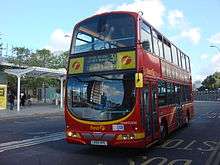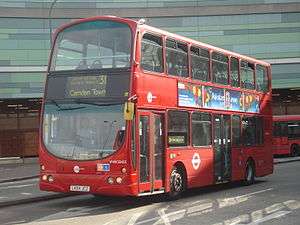London Buses route 31
| 31 | |
|---|---|
|
| |
| Overview | |
| Operator | Tower Transit |
| Garage | Atlas Road (AS) [1] |
| Vehicle | Volvo B7TL 10.1m / Wright Eclipse Gemini [2] |
| Peak vehicle requirement | 23 [3] |
| Night-time | Night Buses N28 & N31 |
| Route | |
| Start | White City bus station |
| Via |
Notting Hill Gate Westbourne Park Maida Hill Kilburn Swiss Cottage |
| End | Camden Town |
| Length | 6 miles (9.7 km) [4] |
| Service | |
| Level | Daily [5] |
| Frequency | 6-10 minutes |
| Journey time | 35-64 minutes |
| Operates | 05:00 until 01:00 |
London Buses route 31 is a Transport for London contracted bus route in London, England. Running between White City bus station and Camden Town, it is operated by Tower Transit.
History
Route 31 commenced operating on 7 September 1911 as a daily route between Chelsea and South Hampstead via Edith Grove, Earls Court Road, Kensington High Street, Notting Hill Gate, Great Western Road, Walterton Road and Belsize Road, replacing horse bus route 36, which also ran between Chelsea and Finchley Road.[6]
Three months later, on 7 December 1911, it was further extended to Finchley Road station. From 31 October 1912, it was re-routed at Belsize Road to run to Gospel Oak via Eton Avenue, Englands Lane and Parkhill Avenue instead of to FInchley Road. However, this extension did not last long and in December 1912 route 31 was curtailed to run daily from Chelsea to South Hampstead (Swiss Cottage).[7]
On 15 May 1916, route 31 was extended to run daily from Swiss Cottage to Tulse Hill via Adelaide Road, Camden Town, Eversholt Street, Russell Square, Southampton Row, Kingsway, Aldwych, Waterloo Bridge, Elephant & Castle, Camberwell Green, Denmark Hill and Herne Hill, replacing route 68, which was withdrawn on the same day. The operation of this long, horseshoe-shaped route between Chelsea and Tulse Hill lasted for one year; after 29 April 1917 route 31 was withdrawn between Camden Town and Tulse Hill, with route 68 being reintroduced to replace it.[8]
From 21 November 1987, the Sunday service was converted to one-person operation, and this was extended to daily operation from 15 April 1989, when was converted to minibus operation with AEC Routemasters replaced by 28-seat Alexander bodied Mercedes-Benz midibuses.[9] In 1988, Gold Arrow routes 28 and 31 were introduced,[10] operated by CentreWest.[11]
These vehicles were quickly found to be too small, and were replaced with Dennis Darts three years later. On 29 May 1999, the route was withdrawn between Notting Hill Gate and Chelsea and replaced by new route 328. Double-deck operation was reintroduced with low-floor Volvo B7TLs in 2004; there was no reduction in frequency.[12]
On 2 December 2006, the route was extended to Shepherd's Bush Green in preparation for the western extension of the congestion charge.
On 29 November 2008, the route was extended to White City bus station to coincide with the opening of Westfield London.[13]
Although route 31 was extended in connection with the Western extension of the congestion charging zone, after the congestion charge was removed, the extension has remained.[14] However, TfL has also committed to a review of bus services, including those in the Western extension zone.[15]
On 22 June 2013, route 31 was included in the sale of First London's Atlas Road garage to Tower Transit.[16][17]
Current route

- White City bus station for Wood Lane station

- Shepherd's Bush station

.svg.png)

- Notting Hill Gate station

- Westbourne Park station

- Maida Hill The Chippenham
- Kilburn Park station

- Kilburn High Road station
.svg.png)
- South Hampstead station
.svg.png)
- Swiss Cottage station

- Chalk Farm station

- Camden Town station

Popular Culture
The route was the subject of the 1985 BBC documentary film To the World's End: Scenes and Characters on a London Bus Route, which followed the route from Camden Town to The World's End, Chelsea, meeting various people who live or work along the route and featuring a score by Carl Davis.[18] The film can be viewed online as part of the BBC Four Collection series of archive programmes made available on BBC iPlayer.
References
- ↑ Carr, Ken. The London Bus Guide. Visions International Entertainment. ISBN 978-0-9931735-3-0.
- ↑ Carr, Ken. The London Bus Guide. Visions International Entertainment. ISBN 978-0-9931735-3-0.
- ↑ Carr, Ken. The London Bus Guide. Visions International Entertainment. ISBN 978-0-9931735-3-0.
- ↑ Carr, Ken. The London Bus Guide. Visions International Entertainment. ISBN 978-0-9931735-3-0.
- ↑ Carr, Ken. The London Bus Guide. Visions International Entertainment. ISBN 978-0-9931735-3-0.
- ↑ David A. Ruddom, Motor omnibus routes in London: November 1908 to December 1912, 2
- ↑ David A. Ruddom, Motor omnibus routes in London: November 1908 to December 1912, 2
- ↑ David A. Ruddom, Motor omnibus routes in London: March 1915 to December 1919, 4
- ↑ Blacker, Ken (2007). Routemaster: 1970–2005. 2 (2nd ed.). Harrow Weald: Capital Transport. p. 113. ISBN 978-1-85414-303-7.
- ↑ Public transport planning and operations. PTRC Education and Research Services Ltd. 1990. p. 109.
Intensive inner London Gold Arrow services 28 and 31, introduced in 1988, have given encouraging results. Individual operating subsidiaries of London Buses Ltd. are making further minibus conversions, such as those of CentreWest in Ealing.
- ↑ "Untitled". Transport. 15: 85. 1994.
It also helps to avoid the instability and wasteful duplication found in deregulated areas. However, local opportunities for service development may also be envisaged, in addition to those devised centrally. Examples include the 'Gold Arrow' midibus services 28 and 31 of the Centrewest company
- ↑ Aldridge, John (September 2004). "In London: From little Sprints to frequent Geminis in 15 years". Buses Magazine. Ian Allan Publishing (584): 14–15.
- ↑ New White City bus station will cater for 10,000 passengers a day Transport for London 25 November 2008
- ↑ "TfL's Report to the Mayor on the Congestion Charging Scheme Variation Orders Consultation" (PDF). TfL. October 2010. p. 36. Retrieved 26 October 2010.
- ↑ TfL's report to the Mayor, page 83.
- ↑ First quits London bus business Bus & Coach Professional 9 April 2013
- ↑ Date set for Aussie takeover of London bus routes Australasian Bus & Coach 14 June 2013
- ↑ http://www.bbc.co.uk/programmes/b0074ry7
External links
 Media related to London Buses route 31 at Wikimedia Commons
Media related to London Buses route 31 at Wikimedia Commons- Timetable
